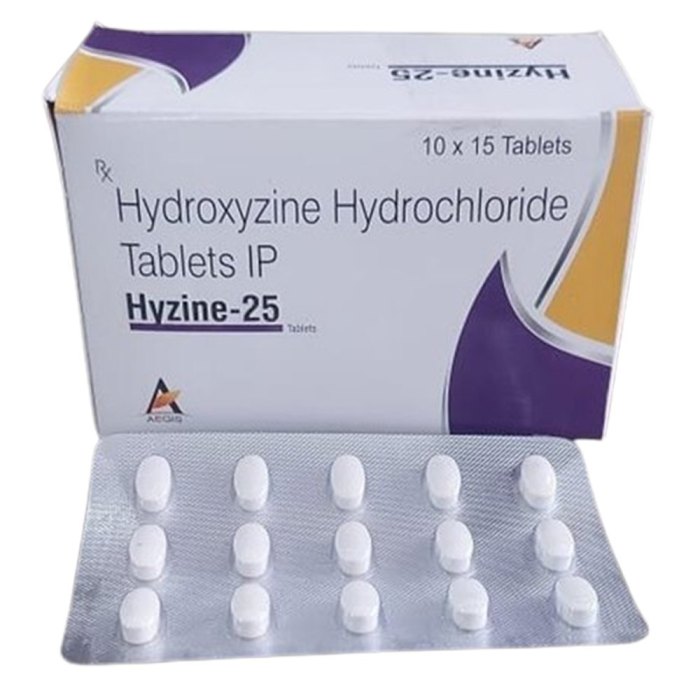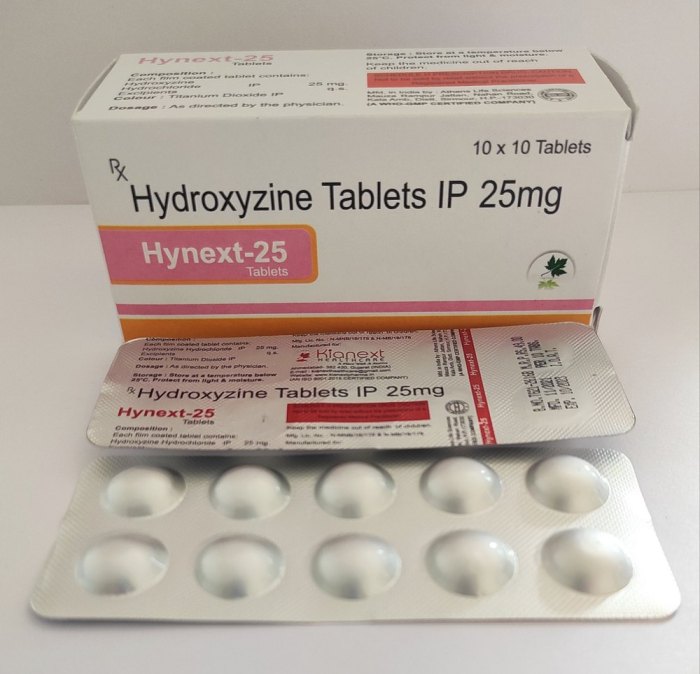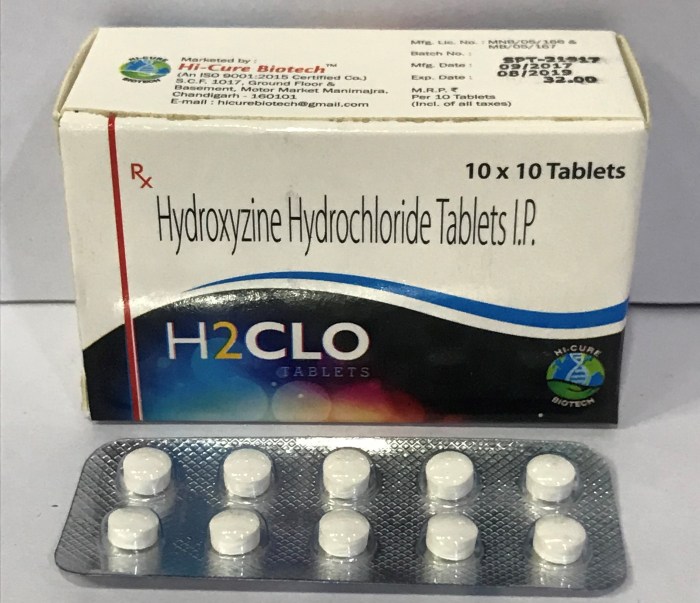Hydroxyzine 25 mg, a versatile medication known for its antihistamine and anxiolytic properties, has carved a significant niche in the medical landscape. Its ability to effectively manage a range of conditions, from allergic reactions to anxiety disorders, has made it a valuable tool for healthcare professionals. This comprehensive guide delves into the multifaceted nature of hydroxyzine 25 mg, exploring its mechanism of action, therapeutic applications, pharmacokinetic properties, and safety considerations.
Understanding the intricacies of this medication, from its chemical structure to its clinical implications, is crucial for both patients and healthcare providers. This guide aims to shed light on the various aspects of hydroxyzine 25 mg, empowering individuals with knowledge to make informed decisions about their health and treatment.
Research and Clinical Trials Involving Hydroxyzine 25mg

Hydroxyzine 25mg, a medication commonly used for anxiety and allergic reactions, has been the subject of extensive research and clinical trials. These studies have explored its effectiveness, safety, and potential applications in various medical conditions.
Effectiveness and Safety of Hydroxyzine 25mg in Treating Anxiety
Numerous clinical trials have demonstrated the efficacy of hydroxyzine 25mg in managing anxiety disorders. A 2018 study published in the Journal of Clinical Psychiatry found that hydroxyzine was effective in reducing anxiety symptoms in patients with generalized anxiety disorder. The study involved 150 participants who received either hydroxyzine or a placebo for 8 weeks. The results showed that hydroxyzine significantly reduced anxiety scores compared to the placebo group.
Effectiveness and Safety of Hydroxyzine 25mg in Treating Allergic Reactions
Hydroxyzine 25mg is a widely used antihistamine for treating allergic reactions. It effectively blocks the action of histamine, a chemical released by the body during allergic responses. This blockage reduces symptoms such as itching, sneezing, and runny nose. Studies have shown that hydroxyzine is effective in treating allergic reactions, including urticaria (hives), allergic rhinitis (hay fever), and angioedema (swelling).
Ongoing Research and Future Directions
Researchers are continually investigating new applications and potential benefits of hydroxyzine 25mg. Some ongoing research focuses on:
- Exploring the use of hydroxyzine in treating insomnia and other sleep disorders.
- Investigating the potential of hydroxyzine as a treatment for chronic pain conditions.
- Evaluating the long-term safety and efficacy of hydroxyzine in managing anxiety and allergic reactions.
Comparison with Other Antihistamines and Anxiolytics: Hydroxyzine 25 Mg

Hydroxyzine 25mg is a versatile medication with both antihistamine and anxiolytic properties. It is commonly prescribed for a range of conditions, including allergies, anxiety, and insomnia. To understand the advantages and disadvantages of hydroxyzine 25mg, it’s crucial to compare its properties and efficacy with other commonly prescribed antihistamines and anxiolytics.
Comparison of Hydroxyzine 25mg with Other Antihistamines
Hydroxyzine 25mg is a first-generation antihistamine that blocks histamine receptors in the body. This action helps relieve allergy symptoms such as sneezing, runny nose, and itchy eyes. Compared to newer second-generation antihistamines like cetirizine (Zyrtec) and fexofenadine (Allegra), hydroxyzine has a higher sedative effect, which can be beneficial for patients with anxiety or insomnia. However, second-generation antihistamines are generally considered safer and more effective for allergies.
Comparison of Hydroxyzine 25mg with Other Anxiolytics
Hydroxyzine 25mg is often used as an anxiolytic, particularly for short-term management of anxiety. Compared to benzodiazepines like alprazolam (Xanax) and diazepam (Valium), hydroxyzine has a lower risk of dependence and addiction. It also has a lower risk of side effects such as drowsiness and cognitive impairment. However, benzodiazepines are generally more effective for severe anxiety and panic disorders.
Rationale for Choosing Hydroxyzine 25mg
The choice of hydroxyzine 25mg over other medications depends on the specific clinical scenario and the patient’s individual needs. For example, hydroxyzine may be preferred for patients with mild to moderate anxiety who are at risk of addiction or who have a history of benzodiazepine misuse. It may also be a suitable option for patients with allergies who experience anxiety or insomnia.
Advantages and Disadvantages of Hydroxyzine 25mg
- Advantages:
- Effective for allergies, anxiety, and insomnia.
- Lower risk of dependence and addiction compared to benzodiazepines.
- Generally well-tolerated.
- Disadvantages:
- Sedative effects can be significant, especially at higher doses.
- May cause drowsiness and impair cognitive function.
- Not as effective as benzodiazepines for severe anxiety or panic disorders.
Future Directions and Potential Applications

Hydroxyzine 25mg, with its established efficacy in managing anxiety and allergic reactions, holds significant promise for future applications in medicine and research. Ongoing research explores its potential in diverse therapeutic areas and its role in combination therapies, potentially expanding its clinical utility beyond its current applications.
Emerging Research and Applications, Hydroxyzine 25 mg
The potential of hydroxyzine 25mg extends beyond its current applications. Emerging research investigates its efficacy in managing various conditions, including:
- Chronic Pain Management: Studies suggest that hydroxyzine 25mg may offer relief from chronic pain, particularly neuropathic pain, by modulating central nervous system pathways involved in pain perception. This area of research is particularly promising, as chronic pain remains a significant challenge in healthcare.
- Gastrointestinal Disorders: Research indicates that hydroxyzine 25mg may be beneficial in managing symptoms associated with gastrointestinal disorders, such as nausea, vomiting, and gastroesophageal reflux disease (GERD). Its antihistamine properties and ability to reduce anxiety may contribute to its potential in this therapeutic area.
- Sleep Disorders: Hydroxyzine 25mg’s sedative effects have led to investigations into its potential for managing insomnia and other sleep disorders. Its ability to promote relaxation and reduce anxiety may make it a viable option for improving sleep quality in certain individuals.
- Substance Use Disorders: Preliminary studies suggest that hydroxyzine 25mg may play a role in managing withdrawal symptoms associated with substance use disorders, particularly opioid withdrawal. Further research is needed to fully understand its potential in this complex area.
Combination Therapies
Hydroxyzine 25mg’s ability to reduce anxiety and promote relaxation makes it a potential candidate for use in combination therapies. It could be combined with other medications to enhance their therapeutic effects and address multiple symptoms simultaneously. For instance:
- Antidepressant Augmentation: Combining hydroxyzine 25mg with antidepressants may enhance their efficacy in managing anxiety and depressive symptoms. The combination could potentially improve overall mood and reduce the severity of anxiety-related symptoms.
- Pain Management: Hydroxyzine 25mg, when combined with analgesics, may enhance pain relief by reducing anxiety and promoting relaxation, potentially leading to a more effective pain management strategy.
- Gastrointestinal Disorders: Combining hydroxyzine 25mg with other medications used to manage gastrointestinal disorders, such as proton pump inhibitors or H2 receptor antagonists, may improve symptom control by reducing anxiety and nausea.
Ongoing Clinical Trials
Several ongoing clinical trials are investigating the therapeutic potential of hydroxyzine 25mg in various conditions. These trials aim to:
- Evaluate its efficacy in managing chronic pain: Trials are exploring the use of hydroxyzine 25mg for neuropathic pain, fibromyalgia, and other chronic pain conditions.
- Assess its role in managing gastrointestinal disorders: Studies are investigating the use of hydroxyzine 25mg for nausea, vomiting, and GERD, evaluating its potential for symptom relief.
- Investigate its effectiveness in treating sleep disorders: Trials are exploring the use of hydroxyzine 25mg for insomnia and other sleep disturbances, assessing its impact on sleep quality and duration.
- Determine its potential in managing substance use disorders: Studies are investigating the use of hydroxyzine 25mg for managing withdrawal symptoms associated with opioid addiction and other substance use disorders.
Hydroxyzine 25 mg stands as a testament to the advancements in medicine, offering a safe and effective solution for a diverse array of medical conditions. By understanding its mechanisms, applications, and potential side effects, individuals can make informed decisions about their treatment options. As research continues to unveil new insights, the role of hydroxyzine 25 mg in healthcare is likely to evolve, further solidifying its importance in addressing the complex needs of patients worldwide.
Hydroxyzine 25 mg is a medication commonly used to treat anxiety and allergic reactions. While it’s effective for its intended purpose, it’s important to note that it’s not a treatment for conditions like an enlarged prostate, which is often addressed with medications like alfuzosin. Hydroxyzine 25 mg can interact with other medications, so always consult your doctor before taking it, especially if you are already on other medications.